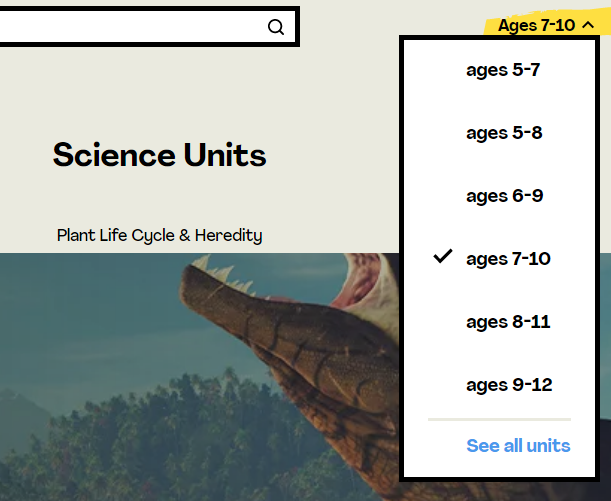Generation Genius and Mystery Science are two online, video-based science programs that have become quite popular among homeschoolers in recent years.
Both programs offer high-quality, NGSS-aligned and secular science lessons on demand and are fairly affordable, as far as online curricula are concerned.
With that said, Generation Genius and Mystery Science do have significant differences in their overall structure and in the way they approach teaching.
To help parents figure out which might be best for their needs, we decided to compare these two digital STEM programs.
What Is Generation Genius?
Founded in 2018, Generation Genius is an online platform containing a wide variety of on-demand educational videos in science and math.
The program aligns with both NGSS and Common Core standards for learning and supports its video learning through a variety of learning resources, such as lesson plans, quizzes, activity ideas and more.
What Is Mystery Science?
Founded in 2011, Mystery Science is an online platform that offers parents and teachers access to a variety of comprehensive science lessons.
Aligning to NGSS standards for science education, Mystery Science teaches its material using a combination of videos, hands-on activities and experiments, discussions and more.
Subjects Taught
Generation Genius and Mystery Science differ in the scope of subjects they cover.
Mystery Science, as its name implies, focuses on teaching science and covers a variety of topics in life, physical and earth science.
In addition to these subjects, Generation Genius tends to go a step further and offers students video lessons and learning materials in math, with videos touching on everything from basic addition and subtraction to transformations, probability, algebraic notation and more.
Consequently, it can be seen as a bit more holistic in terms of overall STEM coverage than Mystery Science.
Age And Grade Ranges Covered
Generation Genius and Mystery Science also have their differences when it comes to the ages and grades they are intended for.
Generation Genius is aimed at K-8 students, taking them from kindergarten and early elementary all the way to middle school science and math.
To do so, it splits its videos and materials into three broad categories, those intended for K-2, 3-5 and 6-8.

In contrast, Mystery Science is (at time of writing) aimed at the K-5 age range, which is a bit more narrow.
Rather than dividing its materials by grade, however, homeschooling parents will find that topics and units are divided instead by age ranges, such as ages 5-7, 5-8, 6-9, 7-10, 8-11 and 9-12.

One thing that homeschooling families should note about both programs is that their subscriptions are all access, so that parents and students can freely pick and choose lessons from any age or grade range.
This makes them fairly well suited to teaching students who are learning outside of a typical age/grade progression, such as precocious students or those that are a little behind.
It also makes things a bit easier for homeschools that are teaching students of different ages.
Generation Genius Vs Mystery Science: Teaching
Although Generation Genius and Mystery Science both primarily teach through video lessons, their approach to doing so can be quite different.
Standards Alignment
Both Generation Genius and Mystery Science align with Next Generation Science Standards for the subjects and grades they teach.
Generation Genius standards alignment information can be found here.
Information about Mystery Science NGSS standards alignment, meanwhile, can be found here.
One thing to note, is that as it touches on K-8 math, Generation Genius also aligns with Common Core math standards.
Video Style
Hosted by company founder, Dr. Jeff Vinokur, Generation Genius’ videos are the backbone of its instruction, each being a standalone lesson in math and science.
The videos are typically around 12 minutes long, are hosted by live actors and are usually brightly colored, exciting and high energy, often making use of props, animations and “field trips” to various locations in order to attract and keep the attention of students.
An example of Generation Genius’ style can be seen in the clip below.
In contrast, Mystery Science full lesson videos are a little more subdued in our opinion.
They tend to mostly use voice over combined with videos, illustrations and pictures to convey information and are really designed to guide students through a lesson, rather than act as a stand alone lecture.

They tend not to be as high-energy, and take a little bit more of a serious tone, focusing more on integrating with the overall lesson material and flow than providing edutainment.
Notably, its videos will pause periodically to introduce topics of discussion, exercises or even activities, which signals parents to introduce lesson material at the right time and gives students the opportunity to complete a task before continuing on.

As a result, although perhaps not quite as exciting as Generation Genius, Mystery Science videos do guide students and parents through a complete lesson in science in easy and step by step manner.
The video lessons even guide parents and students through experiments and activities in a careful, step by step way, which can prevent things from being set up improperly or going wrong somehow.

Like Generation Genius, the video lessons in Mystery Science tend to be pretty short, with each section tending to be about 2-5 minutes long, and so aren’t that hard to sit through.
One thing parents should note is that, in addition to these full videos, Mystery Science also offers mini-lessons on a variety of interest-based topics (such as Do Bats Really Drink Blood?) that tend to be a lot more high energy, humor filled and broadly similar to Generation Genius.
Course Materials Available
Both Generation Genius and Mystery Science offer a wide range of learning material to help parents and teachers make the most out of the videos.
Both programs offer hands-on science lab activities and demonstrations, typically involving common household items, as well as a suite of discussion questions that can help parents and students explore concepts a little deeper.
They also both offer assessments and worksheets that can help formalize the learning a little more.
In terms of assessments, both programs use relatively un-intimidating short form PDF quizzes and tests containing short answer and multiple choice questions.
As can be seen in the screenshot of lesson activities below, Generation Genius also includes access to Kahoot!, which provides game-like practice exercises played against other students and an online quiz system called Quizizz, both of which are some gamified digital practice options that Mystery Science lacks.

Mystery Science does go a little beyond Generation Genius in terms of its former learning options and resources, however, by offering what it calls lesson extensions.
While these vary depending on the lesson, topic and age range, they can include things like science-related readings (including the use of picture and living books), supplemental videos, enrichment discussion questions, and an assortment of extra hands-on activity ideas for certain lessons provided by respected 3rd party websites, such as the Smithsonian, the Kentucky Geological Survey and more.

Course Selection and Structure
Both Generation Genius and Mystery Science are something of an à la carte learning experience.
That is to say, that homeschooling parents and students are free to explore each program’s subjects and topics based on their interests or personal learning plan.
The programs do differ, however, in how much freedom users have when it comes to picking individual lessons.
With Generation Genius, each lesson is self contained and doesn’t rely on any other video in the series for information.

As a result, there is no real proscribed pathway to follow, so users can pick whatever video lessons interest them the most and in whatever order they prefer.
In contrast, although parents are free to select a given age range (e.g. 9-12), subject (life science) and topic (Ecosystems and the Food Web), individual Mystery Science lessons do build upon one another.
As a result, although they are free to pick whatever topic they’d like, students have to take the component lessons in a particular order (lesson 1, 2, 3 and so on).

Which approach is better really depends on the homeschool in question.
While Generation Genius provides a greater level of flexibility, it also means that parents will have to spend a little more time coming up with a plan of action to make the most out of the learning and prevent it from seeming disjointed compared to the more structured and sequential Mystery Science lessons.
Level of Parental Involvement
Both Generation Genius and Mystery Science are teacher/parent-led programs and aren’t really designed for self-study or independent learning.
In both programs, parents act as facilitators, administrators, guides and participants in the back and forth discussions that each lesson contains.
More than that, however, homeschooling parents will also need to decide on an overall learning structure, including which activities and enrichment options to include when available.
As a result, while both Generation Genius and Mystery Science do make learning science a lot easier through their videos and ready materials, they can still require a fair bit of effort and time on the part of parents, which can be an issue for very busy homeschools.
Supplement or Core Curriculum
A final aspect in which Generation Genius and Mystery Science differ is in their intended use.
Although it does have a lot of learning material associated with it, Generation Genius is primarily designed as a science supplement, to be used to bolster the learning of a primary curriculum in a school or at home.
Mystery Science, on the other hand, is designed to be able to be used as a core science curriculum, as well as a supplement.
It is, for example, set up in a bit more of a traditional curriculum style, with units, topics and sequential lessons to follow, as well lesson and unit assessments, NGSS-standards guides and crosswalks for adapting the program to state-level standards.
Further, each lesson in the program contains a number of lesson extensions that can deepen the learning quite a bit, including a number of literature-based connections, readings, quizzes, extra projects, extra videos, additional points for discussion and much more.
The program also offers suggested pacing guides and recommended schedules for parents interested in using its videos and activities as a spine.
Offline use
Both Generation Genius and Mystery Science are online learning programs and do require internet access to use their services.
With that said, both have ways that students can use some of their learning material offline.
Generation Genius, for example, gives parents and teachers the option of downloading each lesson’s learning materials as a PDF file, which can then be printed and used away from the computer, although the videos themselves are still streamed online.
Mystery Science also allows parents and teachers to download lesson materials ahead of time, but also takes things a step further.
The website has a specific function that allows parents to sort of pre-load or download a lesson in a tab, and then play it back (including its videos and other materials) even when offline.

This can make it a little more useful for parents who don’t necessarily want to leave their child on an internet-connected device or for those who live in areas with spotty, slow or intermittent internet connections.
Price
Note: Prices correct as of writing. All prices in USD.
Generation Genius and Mystery Science aren’t all that different when it comes to price.
For homeschools, Mystery Science costs about $99 per household per year for all access.
With Generation Genius, parents have a couple options.
They can purchase yearly access to science and math lessons, which costs about $145 per year.
They can also choose to study science or math only (a little more comparable to Mystery Science) for $95 per year.
Secular Learning
Both Generation Genius and Mystery Science are completely secular homeschool STEM programs and may touch on topics such as heredity, evolution, the geologic age of the Earth, the Big Bang and so on.
As a result, they may not be the most suitable for faith-based homeschools who may find these topics to be controversial.
Summary Chart
| Generation Genius | Mystery Science | |
| Price | $145 for math and science, $95 for math or science | $99 per year |
| Grades | K-8 | K-5 |
| Price includes access to all material | ✔ | ✔ |
| Subjects covered | Math, Science | Science |
| Video Instruction | ✔ | ✔ |
| Assessments | ✔ | ✔ |
| Extra readings and literature | ✔ | ✔ |
| Worksheets | ✔ | ✔ |
| Lesson Plans | ✔ | ✔ |
| Secular Science Instruction | ✔ | ✔ |
| Access to 3rd party resources for experiments, videos and demonstrations | ❌ | ✔ |
| Standards alignment | NGSS, Common Core Math | NGSS |
Bottom Line
Overall, both Generation Genius and Mystery Science are excellent online choices when it comes to homeschool science.
Both programs are high-quality, standards aligned elementary school science programs that deliver interesting and convenient science lessons on-demand.
That said, they do have some significant differences that parents should be aware of.
To help out, we’ve put together a chart of some points that we feel parents might want to consider before subscribing to one of these programs.
| I’m a parent and I want… | Consider |
| A science program that can cover grades K-5 | Either |
| A science program that is suitable for grades 6-8 | Generation Genius |
| A science program that is NGSS standards aligned | Either |
| Lots of fun hands-on activity options and ideas | Either |
| To also get some help in math | Generation Genius |
| To use this program as a supplement to a pre-existing curriculum | Either |
| To expand its use to be the core of my child’s science learning | Mystery Science |
| A program that actively guides me step by step through lessons, discussions, exercises and activities | Mystery Science |
| A program with high energy, engaging and animated videos | Generation Genius |
| A program with videos that strongly integrate with a lesson plan, providing lesson guidance as well as information | Mystery Science |
| A program that can work well even if I live in an area with poor quality internet | Mystery Science |
| A program that gives us maximum flexibility when it comes to picking lessons and topics | Generation Genius |
| Fun, gamified quiz options for assessments | Generation Genius |
| A program that is mostly flexible but offers a little more structure in terms of lesson progression | Mystery Science |
| A program that has a lot of good and guided parent-student interaction | Either |
| A secular homeschool science program | Either |
For More Information
Check out our in-depth review of Generation Genius
Or
Check out the Generation Genius website
Or
Check out our in-depth review of Mystery Science
Or
Check out the Mystery Science website

About the Author
David Belenky is a freelance writer, former science and math tutor and a tech enthusiast. When he’s not writing about educational tech, he likes to chill out with his family and dog at home.
